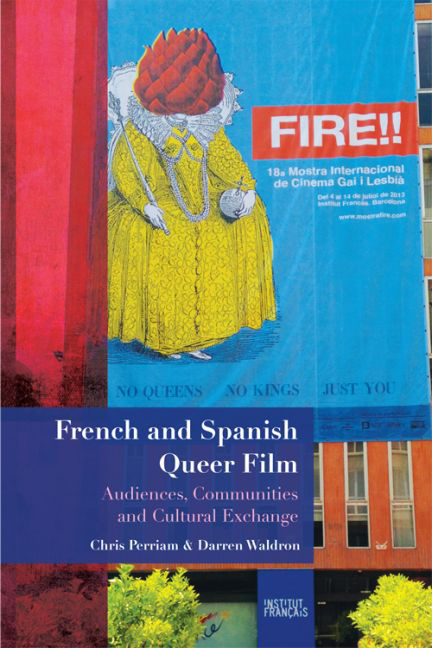Book contents
- Frontmatter
- Contents
- List of Figures
- Acknowledgements
- Introduction
- 1 Cultural Crossovers
- 2 LGBTQ Film Festivals and their Audiences
- 3 LGBQ Themes and Responses
- 4 Trans Issues
- 5 Audiences and Critics: Dialogue and Disagreement
- Conclusion
- Appendix I: Standard Questions for Respondents
- Appendix II: Project Web Page
- Filmography
- References
- Index
1 - Cultural Crossovers
Published online by Cambridge University Press: 12 September 2017
- Frontmatter
- Contents
- List of Figures
- Acknowledgements
- Introduction
- 1 Cultural Crossovers
- 2 LGBTQ Film Festivals and their Audiences
- 3 LGBQ Themes and Responses
- 4 Trans Issues
- 5 Audiences and Critics: Dialogue and Disagreement
- Conclusion
- Appendix I: Standard Questions for Respondents
- Appendix II: Project Web Page
- Filmography
- References
- Index
Summary
It is a fruitful coincidence that, at the time of writing this section on the cultural and historical encounters, dialogues and diasporic flows between France and Spain, much is being made in the French, Spanish and Catalan press about the Spanish Catalan origins of the newly appointed French Prime Minister, Manuel Valls (born in Horta, Barcelona, 13 August 1962) and the Andalusian infancy of the recently elected Mayor of Paris, Anne Hidalgo (born in San Fernando, Cádiz, 19 June 1959), the second and third most powerful positions held by any politician or statesperson in France (Agencia EFE and Comas 2014; de Taillac 2014; Le Parisien 2014; Uría 2014). That both were born in Spain testifies to the enduring strength of the links between the two countries, whose histories, at least over the past five to six hundred years, are intertwined. In fact, their respective appointment and election constitute a fascinating evolution in these interconnected histories. It illustrates how some of the children of Spanish immigrant families have been successfully integrated within the higher ranks of French political life and revises – if this is the correct term – historical events that saw Spain being forced to endure rule by French aristocrats and politicians in the eighteenth and nineteenth centuries. With regards to this book's focus on the LGBTQ dimensions of these Franco-Spanish intersections, both Valls and Hidalgo have championed high-profile LGBTQ causes; Hidalgo served as First Deputy under Bertrand Delanoë, the first openly gay mayor of Paris, and she and Valls were public supporters of president François Hollande's gay marriage legislation, ratified on 17 May 2013 and which triggered what is widely interpreted as the most hostile reaction among conservatives of all Western European countries that have adopted similar laws (Chault 2013; Le Parisien 2013).
The account that follows traces the historical background of these flows by way of attempting to identify what ‘Spain’ and ‘Spanishness’ have tended to signify within political and public imaginaries in France and what ‘France’ and ‘Frenchness’ mean in the same imaginaries in Spain, including Catalunya.
- Type
- Chapter
- Information
- French and Spanish Queer FilmAudiences, Communities and Cultural Exchange, pp. 21 - 40Publisher: Edinburgh University PressPrint publication year: 2016



